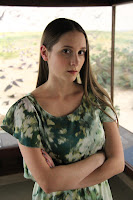Cassidy McFadzean in Conversation
Where would poetry be without talk about poets? I first heard about Cassidy McFadzean in Arc ("the up-and-comers issue," #73), in a memorable introduction to her work by Medrie Purdham. You might remember Medrie from our conversation and her poem in this blog.
SUSAN GILLIS: What brought you to poetry in the first place—or if you prefer, what brought poetry to you?
SUSAN GILLIS: What brought you to poetry in the first place—or if you prefer, what brought poetry to you?
CASSIDY MCFADZEAN: I didn’t read a lot of poetry growing up. I read a bit of E.
E. Cummings in highschool, and wrote bad Cummings imitations, but my main
interest was short stories and novels in translation, my favourites being
Notes From Underground and Crime and Punishment. In University, I
didn’t take a lot of poetry outside the requirements and certainly wasn’t
writing it. In retrospect, I think that something had to click in my brain
before I was ready for poetry. I didn’t understand that a poem was the
effect of its form, sounds, and techniques on the page—that a good poem couldn’t
be paraphrased without losing its magic. I didn’t get it.
This changed the last year of my undergrad when I took a creative writing workshop with Regina poet Medrie Purdham. Medrie’s love for poetry made the genre irresistible. I began to see that those things I loved in fiction—the rhythm of a line or an immediacy of language— could be even more heightened in poetry. I began reading contemporary Canadian poets and really thinking about the effects of form and sound for the first time. It was in this workshop that I also met my husband, Nathan, who was reading Canadian poets like Ken Babstock, Karen Solie, and Jeramy Dodds, as well as Americans like Frederick Seidel and Michael Robbins, poets whose work pays attention to rhyme and form but also the contemporary world, the strangeness of being alive. Poetry has been the main focus of my writing life since encountering these works.
This changed the last year of my undergrad when I took a creative writing workshop with Regina poet Medrie Purdham. Medrie’s love for poetry made the genre irresistible. I began to see that those things I loved in fiction—the rhythm of a line or an immediacy of language— could be even more heightened in poetry. I began reading contemporary Canadian poets and really thinking about the effects of form and sound for the first time. It was in this workshop that I also met my husband, Nathan, who was reading Canadian poets like Ken Babstock, Karen Solie, and Jeramy Dodds, as well as Americans like Frederick Seidel and Michael Robbins, poets whose work pays attention to rhyme and form but also the contemporary world, the strangeness of being alive. Poetry has been the main focus of my writing life since encountering these works.
SG: Your poems have the kind of formal control I associate with musical composition, certain kinds of photography, choreography. You describe that formal awareness clicking for you as though it’s making poetry spring open; what is the relation between form and subject for you?
CM: I hadn’t really thought about the formal control of those art forms, but I think you’re onto something. As an admirer of visual arts, music, and dance, I’m most moved by the tension between freedom of expression and constraint, an invisible charge that I can almost feel as an audience member or gallery-goer.
I think when I write, I strive for a similar balance between chaos and control, or—because my book deals so much with the classical world—the Dionysian and Apollonian. Sometimes my use of form gestures to subject matter, and I think the structure of a poem is another way of evoking the feeling, tone, or energy of a piece, another way to express its texture. Other times, a pattern develops that at first might be unconscious, but lends scaffolding to a poem that might otherwise become too unwieldy. As an artist, I am interested in using all the tools available to create the aesthetics of a piece. Form allows me to explore another element of a thing, and to look at ideas and images from another angle, one that isn’t so easily put into words but expressed through patterns and what’s below the surface of language.
SG: What’s inspiring you these days?
Reading the news seems to be affecting me the most, especially on Twitter. It is impossible to read of police murdering another innocent black man or woman in the US, or the injustices uncovered by the TRC here in Canada, and not feel like my work must address it in some way.
Reading the news seems to be affecting me the most, especially on Twitter. It is impossible to read of police murdering another innocent black man or woman in the US, or the injustices uncovered by the TRC here in Canada, and not feel like my work must address it in some way.
SG: Where do you look for poetry by other
writers?
I’ve found some of the most exciting work shared online by other writers. This is how I came upon Ocean Vuong’s “Someday I’ll Love Ocean Vuong," which was shared by a bunch of poets a few weeks ago, with good reason. http://www.newyorker.com/magazine/2015/05/04/someday-ill-love-ocean-vuong
I’ve found some of the most exciting work shared online by other writers. This is how I came upon Ocean Vuong’s “Someday I’ll Love Ocean Vuong," which was shared by a bunch of poets a few weeks ago, with good reason. http://www.newyorker.com/magazine/2015/05/04/someday-ill-love-ocean-vuong
Cassidy McFadzean is the author of Hacker Packer (McClelland & Stewart 2015). She has been a finalist for the CBC Poetry Prize, the Walrus Poetry Prize, and won second place in the 2014 Short Grain Contest. McFadzean lives in Regina and is a graduate of the Iowa Writers' Workshop. Read her poem Stag Hunt Mosaic here.
